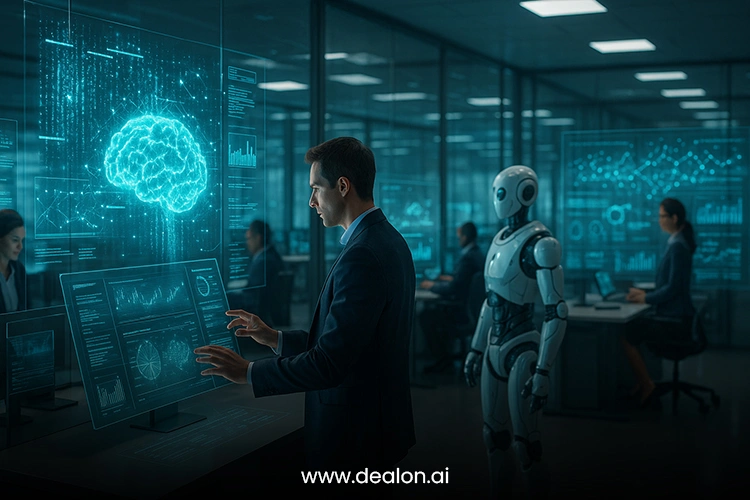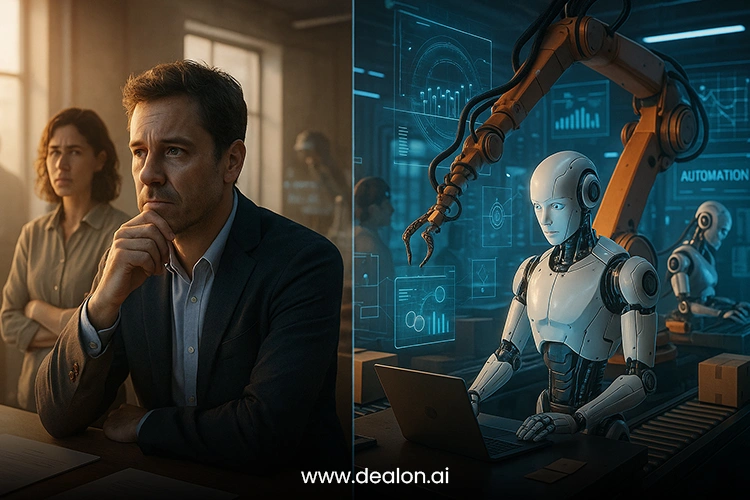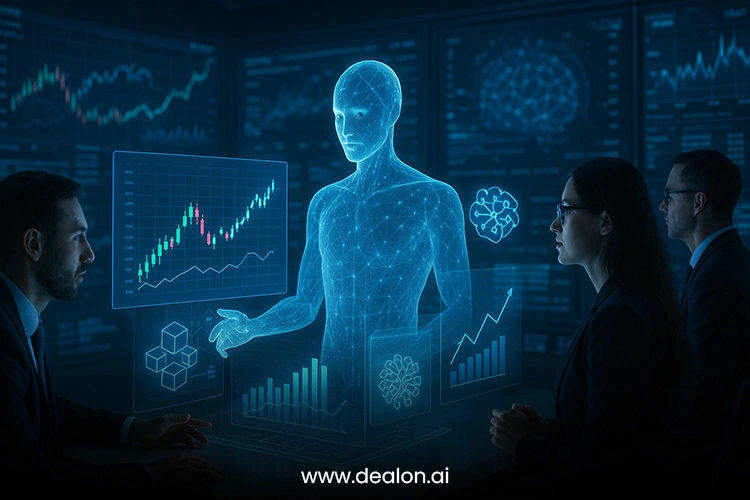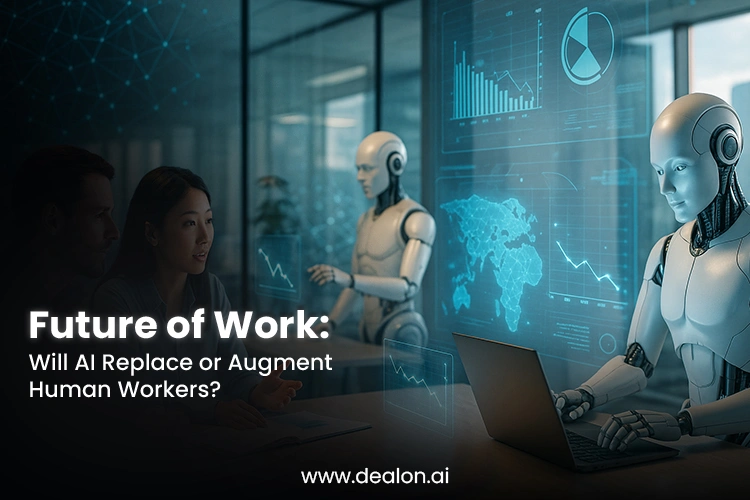The future of work will be changed significantly as a result of AI, which has advanced quickly. As AI continues to improve, a significant question arises: will all the technologies replace the workers or will they help boost them? Workers’ jobs worth saving, which delves into the pressing question of whether technology will ultimately take over our positions. Moreover, this is not just an academic exercise. Instead, it is something businesses, policymakers, and workers must consider as automation and smart systems are changing the reality of the global labour market. The debate over whether AI will eventually replace or augment human workers has taken center stage.
On the one hand, AI offers unmatched efficiency. It can automate tasks, streamline procedures, and reduce human error. Workers in a variety of sectors, from self-driving cars to AI assistants, are already feeling the effects of automation and losing their jobs to it. However, this viewpoint does not consider the possibility that AI may not necessarily take over human jobs but enhance human capacity instead.
AI isn’t seen as a replacement for human intelligence but rather as a tool for working humans to help give them focus on higher-value work, such as creativity, emotional intelligence, and judicious decision-making. In the near future, people and AI may work together in an ecosystem-like workplace that will enhance the capabilities of both. The future of work is not about a choice between human labour and artificial intelligence, but bringing both together for a more innovative and resilient workforce. As we progress, we will need to leverage the complementary strengths of people and machines for the future.
Also Read: 5 Ways Agentic AI Tools and Autonomous Agents are Changing the World
The Rise of AI: A Game-Changer in the Workplace

Industries all over the world are being redefined by Artificial Intelligence, which is turning out to be a great change agent. Organizations across sectors like healthcare, finance, manufacturing, and customer service are transforming with the inclusion of AI. The start of the AI core entity is Powerful algorithms, hardware, and massive data. These systems handle large amounts of data, carry out complex processes, and learn and adapt for better performance over time. The AI is being used in various fields, and its usefulness is increasing, so AI is going to be a must-have in the office.
The efficiencies that AI brings are simply unbelievable. AI systems can analyze data faster than humans. They can reveal patterns we humans would miss. And they can do all that at scale, which is what AAI-powered systems can help businesses improve operational efficiency, increase productivity, and deliver tailored offerings to customers. Monotonous work can be automated now, which would have taken hours of a human worker to do. With automation, humans can do more productive work. AI is doing all sorts of data entry work, stock control, decision-making, etc. In some fields, we need to ask ourselves if we are going to be made obsolete. Would human beings become redundant?
While AI has advanced rapidly, its shortcomings highlight that it cannot replace humans altogether, nor can it become a worker. AI is very good at doing things that require precision, consistency, and analysis of data; however, it still cannot reach the level of performance of human beings where creativity, emotional intelligence, and ethical decision-making are involved. Machines do not appreciate the nuance, moral judgment, or context the way humans do. AI is excellent at processing data, automating tasks, and doing many technical things. However, when it comes to more abstract human functions, AI has its limitations. This challenges the future of work.
To understand the evolution of how AI will change human work, we must see how AI will add to or replace humans. Will AI slowly take over human jobs, or can it work together with human intelligence in a complementary way?
Will AI Replace Human Workers? The Threat of Job Automation

The most debated issue in AI is how it will replace “human” workers, especially in jobs that are manual, repetitive, and routine. Many industries are already experiencing how AI and automation would significantly lessen human touch. One of the significant types of automation in India today is the automated systems in data entry, telemarketing, and customer service. Therefore, companies prefer machines to perform these tasks faster and more accurately. Jobs in the transportation and logistics sector will also be a direct threat due to the development of autonomous vehicles, drones, and robotic delivery systems that require no manual labour.
Job automation is real, and people are afraid that this will lead to unemployment. Assembly line workers and data processors are just two examples of jobs that may not exist in the future because of automation. Although this disruption may sound disconcerting, we must realize that AI will not eliminate human jobs. Instead of removing entire jobs, AI is more likely to take over specific tasks in the workplace, giving humans higher-value work.
AI may be able to do the work, but it cannot do everything that humans can. AI can do repetitive and routine tasks, but is incapable of high-level decision-making or creative problem-solving that needs emotional intelligence, interpersonal communication, and leadership. Therefore, rather than substituting workers entirely, AI will more likely supplement their roles by taking over repetitive tasks. At the same time, humans will focus on more meaningful tasks that require cognitive flexibility, empathy, and innovation.
In the healthcare, education, and creative sectors where human intuition, empathy, and decision-making are required, AI will not likely replace humans. AI can enhance your job and help you do your job faster and better. Machine learning has many applications in healthcare. AI diagnostic tools help healthcare professionals in identifying a disease quickly. Even so, expert knowledge and talking to patients will always remain vital. In education, AI-powered learning platforms can personalize lessons for students; however, the human touch of a teacher’s emotional support and mentorship is essential to a student’s development.
As automation develops further, expect AI to take on specialized tasks increasingly. This should create more opportunities for workers. Some jobs may be lost, but new ones will come up. This will mainly be jobs that require human-like creativity. The change may also see the emergence of new jobs in AI maintenance, data analysis, and programming systems.
Will AI Augment Human Workers? The Symbiosis of Man and Machine

It is becoming evident through the advancement of AI development that out there, it will make human workers better, not replace them. AI will enhance human productivity instead of replacing humans. It will work like a supercharged assistant by making you more efficient, creative, and productive. AI is already showing its potential to complement people’s skills in a variety of industries. As a result, workers can spend time working on higher-value tasks while machines do the simpler ones. The cooperative interaction of workers and AI systems can transform the workplace in novel ways.
Healthcare is one of the areas where AI will help human workers more effectively. AI-powered diagnostic tools are becoming increasingly popular to help physicians improve patient diagnostics and treatment. When looking at vast amounts of data and recognizing patterns that people can’t see, AI helps doctors identify diseases, early, more correctly, and with more accuracy. AI computer algorithms outperform radiologists in reading medical images such as MRI and CT scans.
This allows them to identify irregularities like tumours, fractures, and other pathologies, which may not be noticed. Considering the situation, the role of AI isn’t taking away from the physician but rather enhances their diagnostic power, whereby better and informed decision-making exists for patients.
Again, in education, AI-powered platforms are changing the way teachers interact with students. AI helps in determining the type of learning of a student, offering tailored lesson plans based on specific needs and giving personalized feedback. As a result, educators can now devote their efforts to guiding students on complex issues while creating a better interaction between them.
AI allows teachers to focus on the interpersonal part, with getting to know their students and offering them the emotional support they need to learn. It does this by automating administrative tasks, like grading or student tracking. AI is a force multiplier that enhances and amplifies the impact of teachers without obviating the need for them.
The Role of AI in Human Creativity and Innovation
While AI can perform repetitive tasks and analyze data, it can also help humans become creatively inspired. Have you ever thought about what it means to be human? To feel, to think, to express oneself freely? It is our creativity that sets us apart from animals. We create intellectual ideas that are effective at solving issues. We also produce visible emotional products. While artificial intelligence is capable of processing a lot of data, it does not have human instincts, imagination, or emotion. Nonetheless, this limitation does not stop human workers from working side-by-side with AI and may encourage collaboration.
Many industries, like advertising, marketing, design, and entertainment, are starting to use AI as a creative tool to improve human creativity. AI, for instance, can help designers come up with multiple visuals based on set parameters that they had not even thought of. AI technology has been applied to music by generating forms of melodies and harmonies that serve as inspiration for artists to build upon.
Likewise, Artificial Intelligence in marketing can help in consumer behavior analysis and predicting trends to make the campaigns more innovative. Although in each of these examples, the AI is simply acting as a collaborator, giving data-driven insights and automating certain aspects of the creative process, at the end of the day, you need a human to add the essence to it.
AI can also improve the process of innovation in the science and technology fields. Scientists can help reduce the time and effort needed for research by using tools powered by artificial intelligence. These tools would rummage through data, find patterns, and even generate new ideas for the research. For example, in drug development, AI predicts how different molecules will interact and can help design effective medication. Regardless of it being automated, the process will still require human intuition, experience, and ethical judgment in the future. Although AI can speed up discovery, scientists always ensure to employ their creativity and ethics in the pursuit of knowledge.
The goal is not to beat the human mind but to enhance the human mind using the AI software. Machines may help automate some repetitive tasks, inspire new ideas, or even generate ideas, but they can never provide us with the inflections, emotions, and cultures of a human being. AI is not taking people’s jobs; it is ramping up your creativity, making it a co-pilot.
How Technology and AI Will Change the Nature of Work
As Artificial intelligence keeps progressing quickly, the future of work will be more about machines and men working together. This combination of human and artificial intelligence will change how work is seen and carried out. The workplace of the future may no longer be full of workers separated from technology. The workplace of the future is becoming an ecosystem where human ingenuity and AI innovation work together. This partnership could pave the way for workplaces that are increasingly productive, personalized, and innovative.
One of the most interesting things about this shift is that it takes labor outside of the usual association. Traditionally, work has been construed in terms of roles, and these are task-oriented and repetitive, routine work. Nowadays, with the help of AI, people can automate these tasks, and the human worker will only be involved in higher-level work.
In the future world of work, competencies such as strategic decision-making, emotional intelligence, leadership, and creativity, where human skills far exceed machines, will be critical. In this updated model, there will be a shift to AI for employment requiring heavy data processing, pattern recognition, and repetitive tasks. Thus, workers can concentrate on more value-added activities.
Changing how we view work is a must for transformation. The perception of workers is shifting to view them as vital parts of a bigger machine. Workers’ collaboration with AI will not be considered as labourers performing separate tasks. The workers of the future will use tools powered by AI that help them perform better and achieve higher productivity. This will help them look at problems differently and solve complex problems faster and better than ever. In addition, this new AI-human collaboration will create more spaces for creativity that make work less tedious and more intellectually rewarding.
The developing workspace will also call for massive training and upskilling activities. To succeed in this new paradigm, workers will need to gain insight into AI Systems, how to communicate with them, and how to leverage these systems to achieve personal and organisational goals. In short, employees will need to become co-creators with machines instead of just operators of them any longer.
The paradigm shift requires new forms of education and continuous learning to ensure the ability of workers to remain agile with changing technology. As AI increasingly becomes a part of the daily work tasks of workers, workers will have to be equipped with the necessary skills to manage this relationship successfully.
The Need for Ethical AI Integration
We need to consider the ethics of AI’s application at work, as it is changing the landscape of work. Improper management of AI can cause monumental risks while giving expansive benefits at the same time. The design, deployment, and use of AI must be human-centric and not engineered merely as a means of profit maximization or as a tool for efficiency at the cost of workers.
AI can perpetuate bias and inequality, which has emerged as a significant ethical issue. Machine learning algorithms drive much of today’s artificial intelligence, or AI. This creates a broad scope for bias in AI technology. If we don’t address it, the AI can end up reinforcing the bias present in society, such as racial, gender, or economic bias. Businesses must put strong mechanisms in place for monitoring AI systems. Most importantly, they should ensure that AI systems are being developed fairly and inclusively. AI should be used to advance diversity, equity, and inclusion and support all workers regardless of background or identity.
Furthermore, firms need to consider the social impact of massive automation and artificial intelligence. If left unchecked, automation will make the rich richer and the poor poorer as companies widely adopt AI. While efficiency will definitely improve, job losses are inevitable. Workers must be reskilled and put into jobs when AI takes over more routine jobs. The need of the hour is creating policies that will help workers and businesses adjust to the changing nature of work due to AI. This must happen in collaboration with the government, educational institutions, etc.
The objective of bringing AI in should be to ensure that there is human dignity and workplace independence. As AI systems get better, workers should not lose control. The main point is that AI skills grow in ways that will help the workers be better off. Making sure the AI tools don’t dominate or negate human agency is an essential ethical ingredient. AI has to be a tool for the worker that helps him to do more of his job productively and creatively, instead of taking over his career.
Governments and businesses have the power to create regulations to ensure ethical use of AI. These rules and regulations will prevent the exploitation of the workers and will ensure that the usage of the AI will not cause harm to society at large. Policymakers need to protect workers while maximizing tech innovation. When we use artificial intelligence with ethics, it will be beneficial to more people, wherever they are in the world.
Conclusion
The future of work is a collaborative approach of both human workers and AI. AI will not replace human labor but will improve productivity and creativity. And workers will focus on more valuable tasks. Nonetheless, a transformation will cause various employment issues, which must be addressed, besides the ICTPL. Business sustainability will involve both upskilling of the workpeople and ethical exploitation of AI. Such dual attainment will create workspaces that are innovative and equitable. According to Steve Jordon, the key to success in the coming age would be a special human-machine relationship allowing both to thrive naturally.

